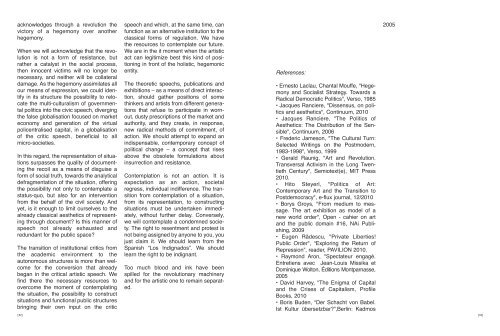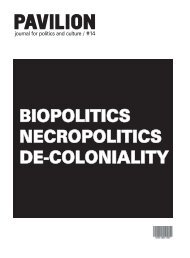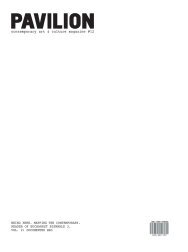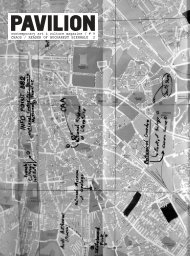Download pdf version of issue no. 16 (4 Mb) - Pavilion
Download pdf version of issue no. 16 (4 Mb) - Pavilion
Download pdf version of issue no. 16 (4 Mb) - Pavilion
Create successful ePaper yourself
Turn your PDF publications into a flip-book with our unique Google optimized e-Paper software.
ack<strong>no</strong>wledges through a revolution the<br />
victory <strong>of</strong> a hegemony over a<strong>no</strong>ther<br />
hegemony.<br />
When we will ack<strong>no</strong>wledge that the revolution<br />
is <strong>no</strong>t a form <strong>of</strong> resistance, but<br />
rather a catalyst in the social process,<br />
then in<strong>no</strong>cent victims will <strong>no</strong> longer be<br />
necessary, and neither will be collateral<br />
damage. As the hegemony assimilates all<br />
our means <strong>of</strong> expression, we could identify<br />
in its structure the possibility to relocate<br />
the multi-culturalism <strong>of</strong> governmental<br />
politics into the civic speech, diverging<br />
the false globalisation focused on market<br />
eco<strong>no</strong>my and generation <strong>of</strong> the virtual<br />
policentralised capital, in a globalisation<br />
<strong>of</strong> the critic speech, beneficial to all<br />
micro-societies.<br />
In this regard, the representation <strong>of</strong> situations<br />
surpasses the quality <strong>of</strong> documenting<br />
the recoil as a means <strong>of</strong> disguise a<br />
form <strong>of</strong> social truth, towards the analytical<br />
defragmentation <strong>of</strong> the situation, <strong>of</strong>fering<br />
the possibility <strong>no</strong>t only to contemplate a<br />
status-quo, but also for an intervention<br />
from the behalf <strong>of</strong> the civil society. And<br />
yet, is it e<strong>no</strong>ugh to limit ourselves to the<br />
already classical aesthetics <strong>of</strong> representing<br />
through document? Is this manner <strong>of</strong><br />
speech <strong>no</strong>t already exhausted and<br />
redundant for the public space?<br />
The transition <strong>of</strong> institutional critics from<br />
the academic environment to the<br />
auto<strong>no</strong>mous structures is more than welcome<br />
for the con<strong>version</strong> that already<br />
began in the critical artistic speech. We<br />
find there the necessary resources to<br />
overcome the moment <strong>of</strong> contemplating<br />
the situation, the possibility to construct<br />
situations and functional public structures<br />
bringing their own input on the critic<br />
[32]<br />
speech and which, at the same time, can<br />
function as an alternative institution to the<br />
classical forms <strong>of</strong> regulation. We have<br />
the resources to contemplate our future.<br />
We are in the it moment when the artistic<br />
act can legitimize best this kind <strong>of</strong> positioning<br />
in front <strong>of</strong> the holistic, hegemonic<br />
entity.<br />
The theoretic speechs, publications and<br />
exhibitions – as a means <strong>of</strong> direct interaction,<br />
should gather positions <strong>of</strong> some<br />
thinkers and artists from different generations<br />
that refuse to participate in wor<strong>no</strong>ut,<br />
dusty prescriptions <strong>of</strong> the market and<br />
authority, and they create, in response,<br />
new radical methods <strong>of</strong> commitment, <strong>of</strong><br />
action. We should attempt to expand an<br />
indispensable, contemporary concept <strong>of</strong><br />
political change – a concept that rises<br />
above the obsolete formulations about<br />
insurrection and resistance.<br />
Contemplation is <strong>no</strong>t an action. It is<br />
expectation as an action, societal<br />
regress, individual indifference. The transition<br />
from contemplation <strong>of</strong> a situation,<br />
from its representation, to constructing<br />
situations must be undertaken immediately,<br />
without further delay. Conversely,<br />
we will contemplate a condemned society.<br />
The right to resentment and protest is<br />
<strong>no</strong>t being assigned by anyone to you, you<br />
just claim it. We should learn from the<br />
Spanish “Los Indignados”. We should<br />
learn the right to be indignant.<br />
Too much blood and ink have been<br />
spilled for the revolutionary machinery<br />
and for the artistic one to remain separated.<br />
References:<br />
• Ernesto Laclau, Chantal Mouffe, "Hegemony<br />
and Socialist Strategy. Towards a<br />
Radical Democratic Politics", Verso, 1985<br />
• Jacques Ranciere, "Dissensus, on politics<br />
and aesthetics", Continuum, 2010<br />
• Jacques Ranciere, "The Politics <strong>of</strong><br />
Aesthetics: The Distribution <strong>of</strong> the Sensible",<br />
Continuum, 2006<br />
• Frederic Jameson, "The Cultural Turn:<br />
Selected Writings on the Postmodern,<br />
1983-1998", Verso, 1999<br />
• Gerald Raunig, "Art and Revolution.<br />
Transversal Activism in the Long Twentieth<br />
Century", Semiotext(e), MIT Press<br />
2010.<br />
• Hito Steyerl, "Politics <strong>of</strong> Art:<br />
Contemporary Art and the Transition to<br />
Postdemocracy", e-flux journal, 12/2010<br />
• Borys Groys, "From medium to message.<br />
The art exhibition as model <strong>of</strong> a<br />
new world order", Open - cahier on art<br />
and the public domain #<strong>16</strong>, NAi Publishing,<br />
2009<br />
• Eugen Rădescu, "Private Liberties!<br />
Public Order", “Exploring the Return <strong>of</strong><br />
Repression”, reader, PAVILION 2010.<br />
• Raymond Aron, "Spectateur engagé.<br />
Entretiens avec Jean-Louis Missika et<br />
Dominique Wolton, Éditions Montparnasse,<br />
2005<br />
• David Harvey, "The Enigma <strong>of</strong> Capital<br />
and the Crises <strong>of</strong> Capitalism, Pr<strong>of</strong>ile<br />
Books, 2010<br />
• Boris Buden, “Der Schacht von Babel.<br />
Ist Kultur übersetzbar?”,Berlin: Kadmos<br />
2005<br />
[33]








